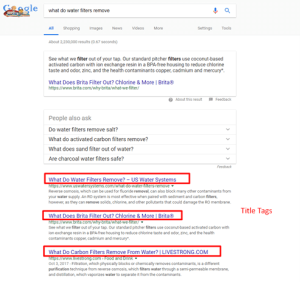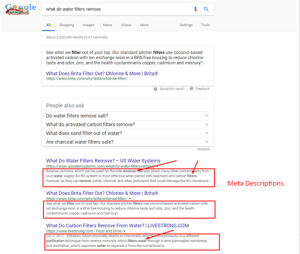How To Write for SEO?
Users depend heavily on search engines, especially Google, to get helpful information for free. One of the biggest ranking factors for high-ranking pages in Google is creating fresh and useful content that answers people’s questions and queries.
Search engine optimization (SEO) has become one of the most important marketing strategies to implement for businesses, since it can help businesses of all sizes rank well on results pages.
But you may be asking yourself, “How do I write for SEO?” or “What should I keep in mind when writing content that I want to rank?” so I don’t make an SEO mistake?

Writing well for SEO all starts with knowing what your target audience searches for on Google, and why.
How to write for SEO?
Ready for some of our best tips when it comes to writing for SEO? Keep reading to learn about keywords, the importance of title and meta descriptions, and so much more!
Find out what people want to know
With about 3.5 billion searches per day according to Google, you need to research what people are searching for in your industry.
In fact, the essential step in writing for SEO is keyword research.
This research is the process of using tools to discover what terms people are searching for and how often. An example of a tool is SEO.com.
With many tools out there that do the job, the most important thing is that you identify keywords that users search for and relate to your business.
In your research, you’ll most likely find keywords that are long-tail, such as “bright pink sweater with buttons.” Long-tail keywords are the ones that will give you the best idea of what people want to know.
Is there a topic or question people are searching for that you, as a company, can confidently explain or answer?
When you find the keywords or search queries that spark ideas for content, write out those content ideas! Remember to copy and paste the keywords that spark your content ideas.
Determine the purpose of your article
Based on all the keywords you discovered, you will have many ideas for content.
Sum up these ideas and organize them into topics. You can spread these topics over weeks, so the more keywords, the better!
When you choose what keywords to write about, you’ll want to look at each one independently and determine the purpose of each article. Refrain from writing on a topic just to target a keyword — instead, think through the purpose of your article and write for humans, not for search engines.
Your content will be the most successful when you write copy that caters to the users search intent, and answers the questions that they want to be answered.
Incorporate research
You’ll want to research the content that you write so that it’s backed up by concrete information. For example, you should aim to include statistics and sources in your content to become a trustworthy member of your industry.
In addition, writing naturally is the most important part of writing for SEO. In the past, people would stuff keywords into content and it would rank successfully. However, since Google continuously evolves its algorithm to provide the best results, keyword stuffing is not recommended today.
Instead, make sure that your content casually incorporates the keywords in content writing that you’ve researched. This will help your content resonate with readers while still being optimized for search engines.
Make content user-friendly
When planning out the structure of your content, it’s important to make it easy on the eyes for readers.
You’ll want to do things like:
- Include bolded headings throughout your content
- Space out your paragraphs
- Include bulleted lists
- Don’t be afraid of white space
- Incorporate images and multimedia to break up walls of text
Content that is not spaced out, does not include easy to read and short headings, bulleted lists, or images to make your information more digestible will not rank well. If Google sees a lot of visitors leaving, it will rank another page higher where most visitors stay longer. How long people stay on your webpage is just another factor that goes into how Google ranks your page!
You’ll also want to ensure that your pages are mobile-friendly, or responsive. Responsive design ensures that users experience your website the same whether they’re using a desktop computer, a smartphone, or a tablet.
Don’t forget about titles, meta descriptions and headings
Titles tags, meta descriptions, and headings are all important to think about when writing for SEO, and they also contribute to some of the most common SEO challenges marketers face. Each one of these components should have one of your keywords incorporated at the front.
Since your title tag is the first thing people see on Google when searching, and it is one thing we know that Google pays attention to, it’s very important that it’s clickable or relatable to what users are searching.
Here’s what a title tag looks like:

Wondering how to write a great headline that gets clicks and traffic? Check out this article!
While meta descriptions don’t affect your ranking, they can affect if users decide to click on your content. Having a meta description that incorporates your keyword, a short description of the content, and a call-to-action is optimal!
If you do not write and set the meta description, Google will automatically pull a random bit of content from your piece to show users in the search engine results. Since whatever Google randomly pulls may not be enticing, it’s best to write it yourself. Often, if you incorporate a keyword in the meta description that someone searches in their query, that keyword will be bolded in the meta description.
Here are meta-description examples. Note the bolded words that grab people’s attention as a relevancy signal to their search:

And finally, headings are important!
Both Google and your readers pay attention to headings, so they’re worth optimizing. If your writing has an enticing headline and headings throughout the piece that people can quickly read, it helps inform readers what your content is about; they will be more inclined to spend time reading the piece.
In addition, because Google checks out the title and headings, it’s important to have your keywords appear in some of the headings. Remember, not to keyword stuff.
Google Maps SEO: 10 Tips to Rank Higher on Google Maps
What is Google Maps SEO? Google Maps SEO (search engine optimization) is the process of making your business visible on Google Maps when users search for related keywords to your business. As an internet user, you have likely done a Google search to find a local store selling the product you’re looking for near you. […]
Read moreHow To Check Google Ranking?
Learning how to check Google ranking lets you know how much exposure your website receives for specific keywords. Checking your website’s Google ranking may help you identify areas of strengths and weaknesses you can improve on to rank higher on the SERPs and boost your return on investment (ROI). Read on for more information about […]
Read moreWhat Is Google EEAT and How To Optimize Your Site?
Over the years, digital marketers have determined the key elements that produce a high-ranking webpage. But little is known about the Google algorithm that puts webpages at the top of the SERP. However, Google has provided helpful guidelines to ensure quality pages match user intent. Explore what Google EEAT is and what you can do […]
Read moreHow To Add Google Analytics to WordPress?
Google Analytics is one of the most efficient web analytics tools offered by Google for businesses and individuals who want statistics on a specific website’s performance. Further to this, it provides you as the site owner with data on visitor insights such as how they access the site, the channels they use, top keywords used to […]
Read more